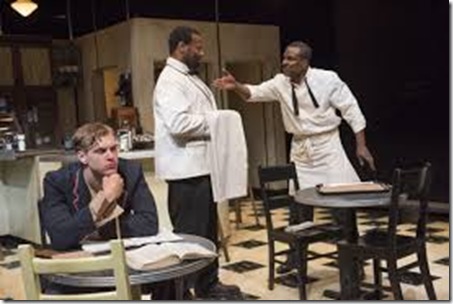The Shaw Festival season triumphs again with Fugard play
Master Harold and the Boys, by Athol Fugard, directed by Philip Akin
NIAGARA-ON-THE-LAKE, Ont. — It’s difficult to pinpoint the exact moment when the racism that has been quietly simmering beneath the surface begins boiling over in the Shaw Festival’s superb production of Master Harold And The Boys.
But that very difficulty is one of the points of Athol Fugard’s painfully nuanced play, set as it is in South Africa in 1950 when apartheid was tightening its grip. Fugard has a particular fascination for the conventions of day-to-day living in an entrenched racist environment, and for those moments when the conventions crumble and the veneer starts to crack. South Africa’s apartheid government had no problem spotting Master Harold’s lurking sub-text — which is why it banned performances of Fugard’s play in 1982 when it first came out.
Designer Peter Hartwell, with his welcome penchant for offering substance rather than flash, has transformed the Court House Theatre playing area into a nondescript tea room in Port Elizabeth, and we’re initially in the presence of two black men who work there. They’re busy cleaning the floors and counters and setting up tables. But they’re not ciphers. Philip Akin’s stunningly detailed production also ensures that we begin knowing something about their inner lives. A big ballroom dancing competition is coming up and the nervous, self-doubting Willie, played by Alan Louis, is awkwardly practicing movements under the attentive gaze of Sam, portrayed here with sustained depth and brilliance by Andre Sills.
We’re not just being drawn into ordinary lives here. We’re being drawn into lives at the bottom rung of the ladder, lives defined by the constraints of a racist culture. That the value of these lives finds some kind of affirmation in the promise of a dance competition — a competition aping elements of South Africa’s
dominant white culture — is but one example of the subtle ironies pervading Fugard’s writings about his tormented country.
The mood changes with the arrival of 17-year-old Hally, son of the family that owns the tea room. He has the habit of dropping in to do his homework and shoot the breeze with his two black friends. Yes, friends. But for all his easy familiarity with them, how color-blind is this typical teenager really? It’s clear that Sam and Willie have watched him grow up, and that they have genuine affection for him. It’s also clear that an astonishing dynamic exists between Sam, in particular, and this boy. There’s the almost vicarious satisfaction that the relatively unschooled Sam takes in Hally’s school studies. More significantly, he functions unobtrusively as this teenager’s middle-aged mentor — his own hard-earned wisdom plus an innate sense of justice and belief in human goodness providing Hally with potential life lessons.
So there is a growing sense here of lives being lived. But they’re not being lived conventionally in the sense of fulfilling the conventions of the old-fashioned well-made play. Hally is a child of his times and his culture: hence those disconcerting symptoms of casual racial entitlement when he abruptly orders Sam and Willy back to work and makes it clear who’s boss. And there’s worse to come.
So why do the most dangerous fault lines suddenly show themselves? In a sense, it’s due to outside agencies — more specifically the miseries of Hally’s family life. As Hally, a fine young actor named James Daly gives us the unthinking adolescent arrogance but also the intellectual curiosity — and, by play’s end, a shame he can’t really confront. Most significantly, there’s vulnerability — and it surfaces in those phone conversations with a distraught mother reaching out to him over the latest crisis involving his father, a disabled, embittered alcoholic.
Hally is a kid who can’t cope — and this leads to the emotional cataclysm that erupts in this humble, unprepossessing tea room during the last 20 minutes of the play. The impact is like a fist through a window, and none of these three lives can ever be the same again.
Daly brings an unsettling psychological truth to his character — but Hally still invites compassion, and that compassion is justly earned. Allan Louis’s fine performance as the flawed and fumbling Willie leaves one wondering whether there’s any real place for the likes of him in such an insidious culture. But it’s the Sam of Andre Sills — his innate dignity and sense of justice intact even in the most degrading of circumstances — that makes the most indelible impression.
English playwright J.B. Priestley wrote a hugely popular play about the “dangerous corners” that can suddenly emerge in one’s life and the perils of negotiating them. Master Harold And The Boys, one of the truly great plays of the last half century, offers its own variation on this theme with a stark dramatic eloquence that is beautifully served in this production.
(Master Harold And The Boys continues at the Shaw Festival’s Court House Theatre until Sept. 10. Ticket information at 1 800 511 SHAW or shawfest.com)
